Discovering the Allure of Dubai's Stunning Gardens
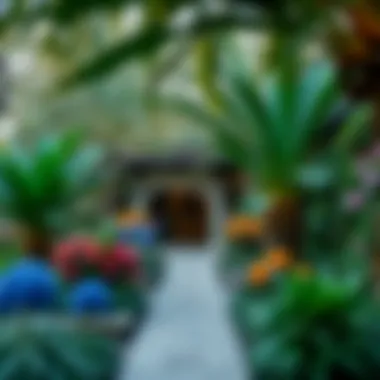
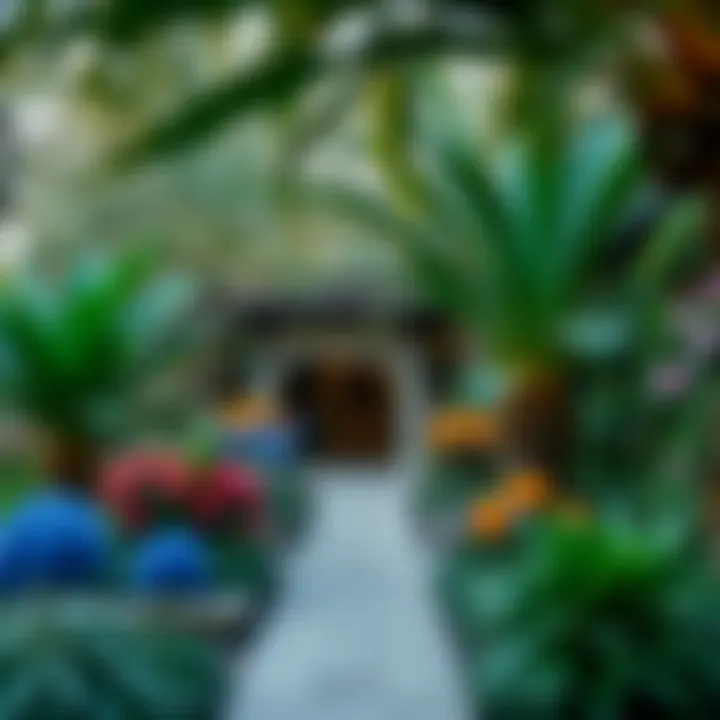
Intro
In the heart of the desert, Dubai stands as a remarkable juxtaposition of modern architecture and serene natural beauty. This bustling metropolis is often associated with its towering skyscrapers and luxurious lifestyle, yet it is home to some of the most extraordinary gardens that breathe life into the urban landscape. The integration of lush greenery amidst the concrete jungle reflects not just the city's commitment to sustainability but also showcases how nature can thrive even in the harshest of climates.
Gardens in Dubai are not mere patches of grass or flower beds. They symbolize a deep cultural appreciation for nature, influenced by centuries of gardening traditions in the region. With the perfect blend of modern design and traditional wisdom, these spaces serve various purposes – from leisure and recreation to environmental conservation.
What makes these gardens particularly fascinating is their adaptability. The unique climatic conditions of Dubai, characterized by high temperatures and low rainfall, have birthed innovative gardening solutions that allow various flora to flourish. Additionally, as we delve into the types of gardens and their respective designs, a clear picture emerges of how these green spaces not only beautify the surroundings but also provide crucial environmental benefits.
Moreover, the growing trend of sustainability has led to the development of eco-friendly gardens that utilize native plants and efficient irrigation systems, ensuring that water is conserved without sacrificing beauty. This alignment with modern ecological principles makes Dubai's gardens a topic worth exploring.
In the sections that follow, we will traverse through the rich tapestry of Dubai’s horticultural scene, uncovering the significance of these gardens in urban life, discussing influential examples, and speculating on future landscaping trends. As we move forward, we will pull back the curtain on various aspects, from market trends to savvy investment opportunities that present themselves in this flourishing landscape.
Intro to Gardens in Dubai
Gardens in Dubai represent a vibrant intersection of nature and urban life, offering a slice of greenery amid the sprawling cityscape. The rise of green spaces in this metropolis is more than just an aesthetic choice; it's a matter of sustainability, well-being, and cultural identity. These gardens, often carefully curated, serve as a refreshing counterbalance to the bustling atmosphere that characterizes Dubai.
The importance of gardens in Dubai can be seen through various lenses. Primarily, they provide essential green lungs that help combat the urban heat, which can become unbearable in the hotter months. This cooling effect not only benefits the local environment but also enhances the overall quality of life for residents and visitors alike. For expatriates, who may find themselves far from their homeland, these gardens offer a sense of familiarity—a piece of nature that resonates with their own cultural backgrounds.
Moreover, Dubai's gardens play a pivotal role in promoting biodiversity. While the arid conditions challenge the cultivation of various plant species, these gardens have been designed using innovative techniques that allow for the flourishing of both native and exotic plants. This careful planning contributes to the overall ecosystem, creating habitats for various wildlife, thus transforming urban spaces into a sanctuary for various species.
In addition to their ecological significance, gardens in Dubai also cater to comfort and leisure. They are meticulously designed to provide spaces for public gatherings, social activities, and recreational pursuits. People from all walks of life utilize these green spaces for joggling, picnicking, or just enjoying a quiet moment away from the cacophony of the city.
As Dubai continues to expand and evolve, so too does its commitment to integrating these green spaces into the urban landscape. Investors and analysts should take note of this trend as it presents unique opportunities for community development and sustainability projects. Potential buyers may find that properties near these green spaces not only maintain higher property values but also offer a significant lifestyle advantage that emphasizes well-being and accessibility to nature.
"The essence of well-being in a city like Dubai can often be found in its gardens, where nature's beauty blends seamlessly with urban living."
In summary, the gardens of Dubai reflect a broader trend toward sustainability and urban biodiversity. They symbolize a collective effort to create a city where nature and urban life coexist harmoniously. As we explore the gardens in more detail throughout this article, it is vital to appreciate their multifaceted roles—ranging from ecological benefits to enhancing the quality of life and providing economic opportunities.
The Significance of Green Spaces in Urban Settings
In the heart of bustling urban environments, such as Dubai, green spaces play an essential role. These oases of nature are not just a reprieve from the surrounding high-rise buildings and busy roads; they offer numerous benefits that extend to biodiversity, social health, and overall quality of life. As cities continue to grow, the integration of gardens and parks into urban planning becomes vital for creating a balanced ecosystem.
The impact of these spaces resonates through various facets of urban life. From reducing temperature variations to decreasing pollution levels, green areas contribute significantly to the environmental health of cities. Moreover, they offer aesthetic beauty and recreational opportunities for the residents. In a city like Dubai, where the desert landscape dominates, the presence of vibrant gardens reminds us of the importance of cultivating and preserving nature.
"Green spaces are essential for creating a sustainable urban environment where nature and city life coexist harmoniously."
Enhancing Urban Biodiversity
Biodiversity in urban settings can seem like an uphill battle. However, incorporating green spaces directly into cities can create a haven for various species. In Dubai, the introduction of gardens encourages the flourishing of local wildlife, which is crucial for ecological balance. By planting native flora, these gardens not only beautify the surroundings but also support local fauna, such as birds, insects, and other animals.
- Native plants require less water and maintenance, making them an ideal choice.
- They provide food and habitat for local wildlife, strengthening the ecosystem.
- Biodiversity in urban gardens contributes to a more resilient environment, capable of withstanding urban stresses.
Urban gardens can create vital corridors for wildlife, allowing them to migrate and thrive despite the urban sprawl. This harmony between city infrastructure and biodiversity enhances the ecological footprint of urban settings.
Promoting Mental Well-being
The mental benefits of green spaces are profound. Studies have shown that spending time in natural environments can significantly reduce stress and anxiety. For the residents of Dubai, where the pace of life can be frenetic, the tranquil gardens serve as peaceful retreats.
Having access to green spaces is linked to improved mental health, fostering relaxation and mindfulness. Whether it’s through taking leisurely strolls, enjoying group activities, or simply basking in the serene atmosphere, gardens offer an escape from life’s demands. The psychological benefits do not just stop at individual wellness; they extend to communities, creating stronger social ties.
Some key points include:
- Reduced stress levels: Exposure to nature calms the mind and body.
- Increased social interaction: Community gardens encourage residents to connect and forge relationships.
- Enhanced creativity: Natural settings stimulate innovative thinking and problem-solving.
In summary, the significance of green spaces in urban settings, particularly in a unique place like Dubai, cannot be overstated. They enhance biodiversity and promote mental well-being, making them indispensable in the quest for a healthy urban lifestyle.
Unique Climatic Challenges in Dubai
Dubai stands out not only for its towering skyscrapers and opulent lifestyle, but also for its unique climatic challenges that profoundly impact gardening and landscaping practices. With scorching summers reaching upwards of 50°C and minimal yearly rainfall, the very essence of gardening in this arid metropolis lies in addressing these adversities. Understanding these challenges is vital, both in preserving plant life and fostering successful green spaces that harmoniously coexist with the urban environment.
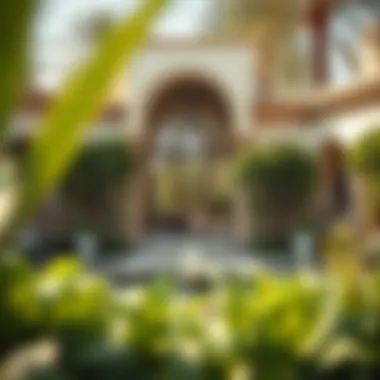
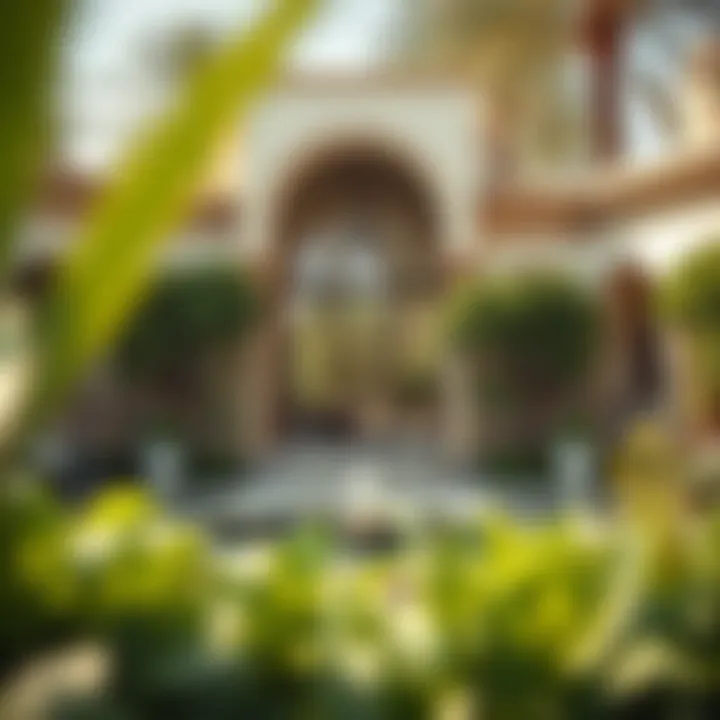
Heat Management Strategies
In a place where the sun's relentless gaze can scorch even the most durable of plants, heat management becomes a critical factor for successful gardening. Various techniques are employed in Dubai to shield gardens from the relentless sun.
- Shade Structures: Many gardens implement shade nets or pergolas to diffuse sunlight and protect tender plants from direct exposure. These structures not only reduce heat but also add an aesthetic touch to the garden design.
- Plant Selection: Choosing the right plants is paramount. Native and drought-resistant species such as the Ghaf tree or various succulents can withstand high temperatures and require less maintenance. Using these plants minimizes heat stress and promotes sustainability.
- Soil Management: The soil's composition plays a pivotal role in managing garden temperatures. Mulch can be used to cover the soil surface, keeping it cool and retaining moisture—a vital concern in hot climates.
- Glass Greenhouses: Employing innovative greenhouse designs that focus on ventilation and cooling can allow for year-round gardening, even in the intense heat of summer.
By implementing these heat management strategies, Dubai’s gardens can flourish, transforming the harsh climate into a lush, inviting space.
Water Conservation Techniques
Water is, without a doubt, the lifeblood of any garden, and in a region that grapples with scarcity, implementing effective water conservation techniques is not just beneficial—it is essential. Here are some methods that savvy gardeners in Dubai might adopt:
- Drip Irrigation: This is a game-changer for water efficiency. Instead of wasting water through traditional sprinklers, drip systems deliver water directly to the plant's roots in precise amounts. This not only conserves water but also promotes healthy growth by reducing waterlogging.
- Recycled Water: With initiatives promoting eco-friendliness, using treated wastewater for irrigation can drastically cut down on fresh water usage. Communities and parks are increasingly tapping into this sustainable resource.
- Rainwater Harvesting: Although rainfall is scant, when it does occur, collecting and storing rainwater can provide an additional water source for gardens. Using barrels or tanks to gather water can make a significant difference.
- Hydroponics: For those looking to take water conservation to the next level, hydroponic systems allow plants to grow without soil, using nutrient-rich water instead. This method uses up to 90% less water than traditional gardening methods.
These water conservation techniques not only provide solutions to pressing issues but also reflect Dubai’s commitment to sustainability and eco-friendliness in its urban landscaping efforts.
"Gardening in Dubai is not merely about planting but adapting to one of the harshest climates on Earth."
As we forge ahead, the lessons learned in managing heat and conserving water will play a big role in shaping the city's future gardens, ensuring that they thrive, even in the face of adversity.
Notable Gardens in Dubai
Dubai boasts a remarkable range of gardens, serving as a testament to the city’s commitment to integrating nature into its urban environment. These green havens are crucial not just for their aesthetic appeal but also for their role in enhancing the quality of life for residents and visitors alike. When diving into the notable gardens of Dubai, one uncovers the thought and care that has gone into creating spaces that are both beautiful and functional. These gardens help to combat the challenges posed by urbanization, offering an escape from the bustling city life while providing educational and recreational opportunities.
Dubai Miracle Garden
Design and Aesthetic Features
The Dubai Miracle Garden stands out due to its extraordinary design and eye-catching aesthetic features. Spanning over 72,000 square meters, this garden prides itself as the largest natural flower garden in the world, showcasing about 150 million flowers across various themes. One of the key characteristics of this garden is its intricate structures, such as life-sized houses and arches crafted entirely from flowers. This innovative use of flora creates an enchanting environment that draws in tourists from around the globe.
The use of vibrant colors and imaginative designs contributes significantly to the allure of the Miracle Garden. It transforms the imagination into reality, making visitors feel as if they have stepped into a fantastical world. However, the complexity of maintaining such displays can be a double-edged sword. While the visual impact is undeniably stunning, it requires meticulous planning and excessive resources. This raises questions about sustainability in terms of water usage and ongoing maintenance efforts.
Seasonal Attractions
Seasonal events in the Dubai Miracle Garden add another layer to its charm. Each season brings new themes and displays, allowing the garden to remain fresh and engaging for repeat visitors. For instance, the Valentine’s Day attraction, which features heart-shaped floral arrangements, perfectly showcases the garden’s flair for creativity. These seasonal attractions not only lure tourists but also enhance the local economy by extending the tourist season.
While seasonal displays provide excitement and variety, they can also pose challenges regarding plant survival and care during off-peak times. This could lead to questions about the long-term sustainability of having such transient qualities. Nevertheless, these unique features contribute to the garden's status and serve as tangible reminders of how art and nature can coexist beautifully.
Emirates Botanical Garden
Research and Conservation Efforts
The Emirates Botanical Garden presents a remarkable focus on research and conservation, making it a pivotal player in preserving biodiversity in the region. This garden is not merely a place for leisure but also a scientific hub where researchers engage in the study of native plant species and their adaptations to Dubai's harsh climate. A major characteristic of its efforts is the commitment to rehabilitating endangered plant species, particularly those native to the Arabian Peninsula.
This practice is immensely valuable in fostering a deeper understanding of local ecosystems and their fragility. Interestingly, this approach encourages community involvement, generating awareness and participation in conservation efforts. However, some challenges arise in effectively communicating the importance of these efforts to a broader audience, particularly in a city driven by rapid development.
Visitor Engagement Initiatives
As part of its commitment to education, the Emirates Botanical Garden implements various visitor engagement initiatives that provide insights into sustainable gardening practices and local flora. Workshops and guided tours are common, allowing visitors to learn about the importance of plant conservation firsthand. One of the notable features is the garden’s interactive displays, which attract families and encourage a deeper appreciation for nature among children.
While these programs significantly enhance public understanding, they require consistent funding and resources to maintain engagement. The challenge lies in balancing educational objectives with the entertaining aspects of garden visits. Just as the garden enriches the local community through horticultural education, it also fulfills a vital cultural role, fostering a sense of responsibility toward the environment.
"Gardens in Dubai are a fusion of art, science, and community, playing a significant role in shaping the city's identity and sustainability efforts."
Cultural Perspectives on Gardening
Gardening in Dubai is more than just landscaping; it carries deep cultural significance and reflects the values, traditions, and aspirations of diverse communities. Understanding these cultural perspectives provides important insights into the various approaches to gardening in this vibrant city. This section sheds light on traditional practices and how modern influences shape today's gardening landscape, making it essential for community members and investors alike to appreciate the nuanced interactions between culture and gardening.
Traditional Gardening Practices
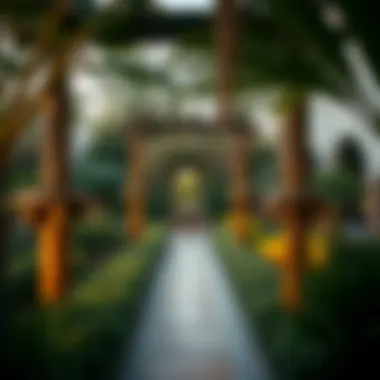
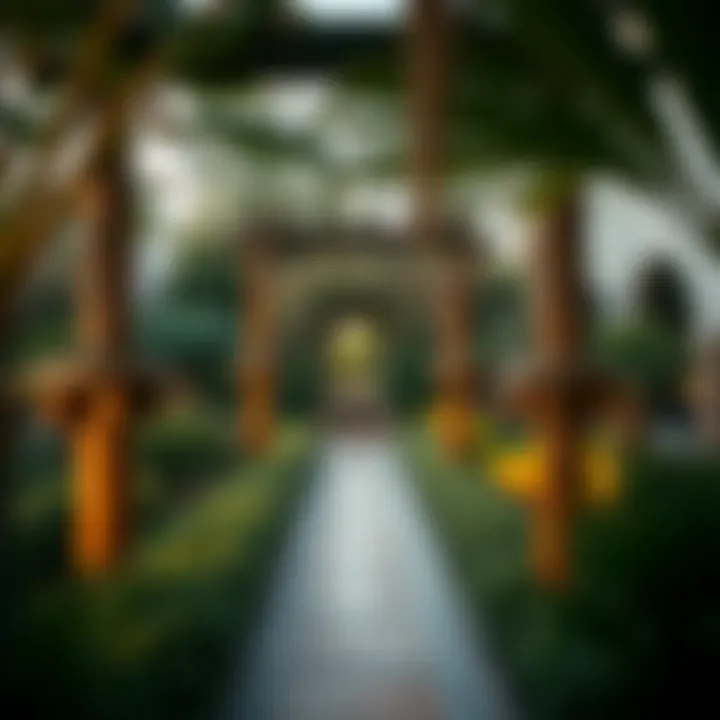
Traditionally, gardening in Dubai involved simple yet impactful methods, tailored to the harsh desert climate. One notable practice is the use of ghaf trees, which are native to the region and serve multiple purposes, from shade to soil stabilization. These trees illustrate the delicate balance between local flora and sustenance, emphasizing sustainability long before it became a buzzword.
Another vital aspect is the kitchen gardens, often found in residential areas where families cultivated crops such as dates, citrus, and herbs. This practice wasn’t merely for food; it was a way to instill values of self-sufficiency and family bonding, where gardening was often a family affair, strengthening ties among generations. It’s a beautiful sight to see grandparents teaching their grandkids how to care for a plant, instilling in them a sense of responsibility and respect for nature.
Additionally, traditional irrigation methods, like falaj systems, played a pivotal role in ensuring that gardens were nourished with precious water. These ancient channels redirected water from groundwater sources to cultivated areas, showcasing an early understanding of water conservation, which holds relevance even today amid modern challenges. The emphasis has always been on creating a symbiotic relationship with the environment rather than exploiting it.
Modern Influences and Trends
The gardening scene in Dubai is not static. The rise of social media platforms has notably changed how communities engage with gardening. Youth are increasingly drawn to urban gardening, fueled by online inspiration and a desire to transform concrete jungles into vibrant patches of green. This evolution has led to the creation of Instagrammable gardens that not only serve aesthetic purposes but also encourage a culture of sharing and learning about sustainable practices.
Furthermore, influencers play a critical role, introducing modern gardening concepts such as hydroponics and aeroponics. These methods allow individuals to cultivate plants in urban settings with limited space and resources, thus attracting young professionals interested in sustainable living. You can see these trends manifested in popular community markets, where local produce fosters a sense of conscientious consumerism amidst the backdrop of a fast-paced city.
This amalgamation of traditional practices and modern influences has prompted a fresh dialogue around gardening. It champions both conservation and innovation, urging communities to not only preserve their heritage but to also embrace modern methodologies. As highlighted by experts, these conversations deepen our connection with green spaces and compel us to consider our role in shaping the urban environment.
"In every garden, there is a story—a blend of tradition and innovation that illustrates the resilience of nature and humanity's desire to coexist harmoniously."
As Dubai continues to evolve, the importance of blending traditional wisdom with contemporary landscaping trends cannot be overstated. The convergence of these perspectives nourishes not only the gardens but also the community, fostering a sense of belonging and purpose.
Relevant Links
- Wikipedia on Traditional Gardening
- Britannica on Middle Eastern Gardening Practices
- Reddit Community on Urban Gardening
- Sustainable Gardening Initiatives
Sustainability Initiatives in Gardening
Sustainability is more than just a buzzword; it's a vital practice that ensures gardens not only look beautiful but also contribute positively to the environment. In Dubai, with its unique weather and rapid urban development, adopting sustainable practices in gardening has become crucial. These initiatives not only help in conserving resources but also promote biodiversity and create a healthier living environment.
Use of Native Plants
One of the cornerstones of sustainable gardening in Dubai is the use of native plants. These plants are suited to the local climate, which means they require less water and are more resilient to pests and diseases. The introduction of native flora into gardens not only enhances visual appeal but also supports the local ecosystem. For instance, the Ghaf tree, a symbol of endurance, thrives in the arid conditions of the UAE while providing shelter and food to local wildlife. Using such plants reduces the need for chemical fertilizers and pesticides, thereby promoting a healthier garden.
The advantages don’t just stop at ecological benefits; incorporating native species can significantly lower maintenance costs. Since these plants naturally flourish in the local landscape, they diminish the need for excessive irrigation and intervention, which can be burdensome, especially during Dubai's intense summers. Opting for native plants is not just environmentally responsible; it’s also economically savvy.
Innovative Irrigation Systems
Water conservation is paramount in a desert city like Dubai, making innovative irrigation systems an essential component of sustainable gardening. Traditional watering methods are often inefficient and lead to wastage, which is not tenable in a place where water is a precious resource. Implementing smart irrigation solutions, such as drip irrigation systems and weather-based controllers, can drastically improve efficiency. These systems deliver water directly to the roots of the plants, minimizing evaporation and runoff.
Moreover, advanced technology allows for monitoring soil moisture levels, ensuring that gardens receive exactly the amount of water needed. For instance, in the Dubai Marina, community gardens are equipped with these systems, reducing water usage by over 50%. The fusion of technology and nature in gardening practices symbolizes Dubai’s commitment toward a sustainable future.
"Embracing innovative irrigation techniques ensures that gardens not only survive but thrive in challenging environments like Dubai," says environmentalist Sarah Ahmad.
The Role of Community in Urban Gardening
In the sprawling landscapes of Dubai, where steel and glass structures punctuate the skyline, the role of community in urban gardening emerges as a lifeline that intertwines nature with the human fabric of the city. This section dives deep into how communal gardening initiatives not only beautify the environment but also enhance social bonds, create educational opportunities, and foster resilience among the urban populace. These gardens serve as vital spaces where individuals congregate, share resources, and cultivate a deeper connection to both nature and one another.
Community Gardens and Social Cohesion
Community gardens in Dubai are not just patches of greenery; they are beacons of unity. These communal spaces often serve as the heart of neighborhoods. They provide residents with an opportunity to develop friendships and foster a sense of belonging. In a cosmopolitan city where diverse cultures converge, these gardens promote social cohesion by enabling different communities to interact and collaborate on shared gardening projects.
- Shared Responsibility: Residents come together to plant, maintain, and harvest crops, thereby fostering a sense of shared ownership. This collaboration often leads to the development of trust and mutual respect among members of diverse backgrounds.
- Cultural Exchange: Garden initiatives allow individuals to share traditional planting techniques, recipes, and horticultural knowledge. As they exchange ideas, they strengthen cultural ties and promote an understanding of each other's practices, thus enriching the communal experience.
- Reduced Isolation: For many urban dwellers, especially expatriates living away from their home countries, community gardens provide a vital social outlet. Participating in gardening activities helps reduce feelings of isolation and gives individuals a chance to build friendships that transcend cultural barriers.
"Gardening transcends borders, bringing people together and creating ties that are not easily broken."
Educational Programs and Workshops
Alongside the act of gardening itself, educational programs and workshops play a crucial role in enriching the community's understanding of sustainable gardening practices. In these settings, knowledge is not kept in silos; rather, it flows freely from expert gardeners to eager learners.
- Skill Development: Workshops can cover an array of topics, from basic gardening techniques to advanced permaculture strategies. Participants learn valuable skills that empower them to cultivate their own gardens effectively.
- Healthy Living Promotion: Many of these programs emphasize healthy eating habits, encouraging gardeners to grow their own organic produce. By understanding where their food comes from, individuals are more likely to make healthier choices, ultimately leading to improved community health.
- Environmental Awareness: Educational initiatives often tackle issues like water conservation and biodiversity. Such knowledge is vital in a region like Dubai, where environmental sustainability is essential for future urban developments. Through workshops, participants can learn about native plants and how to care for them, fostering a greater appreciation of local ecology.
- Youth Engagement: Programs aimed at children and teenagers are especially effective in embedding a culture of responsibility towards the environment. Schools often partner with community gardens to arrange field trips, teaching the younger generation about gardening, teamwork, and ecological stewardship.
Future Trends in Landscaping
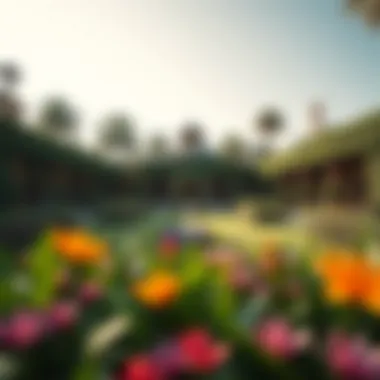
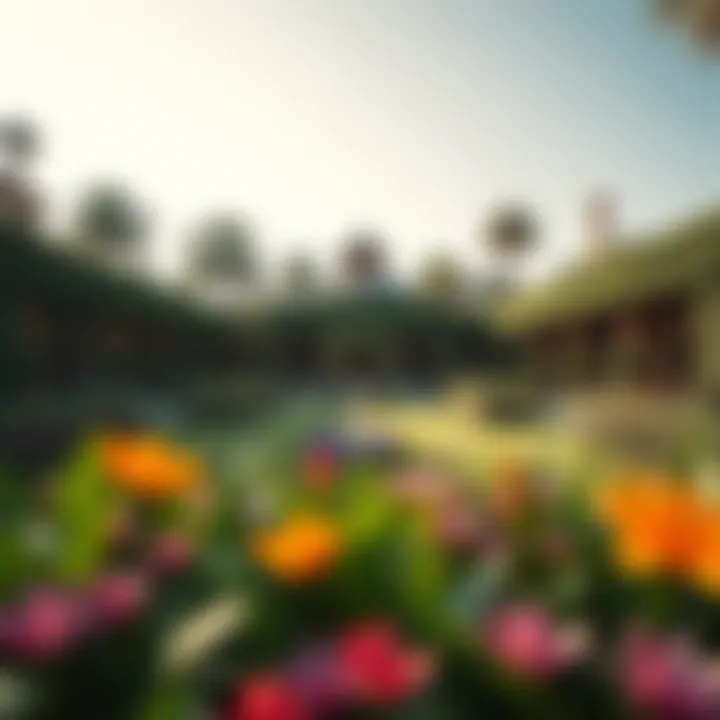
As modern cities continue to expand, the importance of innovative landscaping trends cannot be overstated. In Dubai, the need to harmonize urban growth with nature is paramount. Future trends in landscaping to tackle the challenges of urban living are not just limited to aesthetics; they revolve around sustainability, efficiency, and adaptability. By understanding these trends, we can appreciate how they shape not only the environment but also the community's lifestyle. Investors and expatriates should pay particular attention to this evolving landscape, as these trends can significantly enhance property values and quality of life.
Vertical Gardening Techniques
Vertical gardening has emerged as an innovative solution to space constraints in urban areas like Dubai. These techniques allow plants to grow upwards, maximizing limited space while providing aesthetic appeal to a building or outdoor area. Implemented successfully, vertical gardens can help improve local air quality, reduce noise levels, and even serve as insulation for buildings. They can transform stark walls into vibrant green spectacles, making urban environments more inviting.
Key benefits include:
- Space Optimization: Allows for gardening in areas where ground space is scarce.
- Thermal Regulation: Reduces heat absorption in buildings, leading to lower cooling costs.
- Biodiversity Enhancement: Attracts various species of birds and insects, which in turn enriches local biodiversity.
Common techniques include modular systems that use lightweight containers for plant growth, hydroponics for soil-less cultivation, and green facades, where climbing plants are integrated into the building's structure. Many architects and designers are increasingly incorporating these elements into new projects, ensuring that future developments right here in Dubai will not only beautify the surroundings but will also promote ecological health.
Smart Gardening Solutions
In an age where technology intertwines with daily life, smart gardening solutions are becoming essential in creating lush gardens that require minimal maintenance. By utilizing IoT (Internet of Things) devices, urban gardeners in Dubai are able to monitor plant health and optimize watering schedules. Automation makes it easier to maintain gardens, even in the often harsh conditions of the desert climate.
Examples of smart gardening applications include:
- Soil Sensors: These devices monitor moisture levels, pH, and nutrient content to provide data-driven insights into the optimal care for plants.
- Automated Irrigation Systems: Designed to conserve water by supplying the right amount of hydration precisely when needed, thus minimizing waste.
- Mobile Applications: Many gardeners now rely on apps to track plant growth, receive care tips, and even connect with local gardening communities.
"The integration of technology in gardening is changing how we interact with nature, even in the most urbanized environments."
These advancements reflect a global shift toward sustainability and efficiency, especially crucial in arid climates like Dubai. For investors and property developers, embracing these trends can not only enhance property appeal but also meet growing consumer demands for ecological responsibility.
As we forge ahead into a new era of landscaping, it’s clear that innovative techniques like vertical gardening and smart gardening solutions will redefine how Dubai interacts with greenery. With a commitment to progress, the city’s gardens can evolve in ways previously unimaginable, contributing to a resilient urban landscape that marries luxury and sustainability.
Economic Impact of Green Spaces
The notion of integrating green spaces into urban settings goes beyond mere aesthetics. In a bustling metropolis like Dubai, where skyscrapers scrape the sky, the presence of gardens plays a substantial role in shaping the economic landscape. These spaces not only enhance property values but also provide various recreational opportunities that ultimately contribute to the economy.
Green areas foster a sense of community, attract tourism, and can even create jobs, making them a vital part of Dubai's urban makeup. The economic impact is multifaceted, encompassing both direct benefits and broader social implications. As investors and urban planners consider these aspects, it becomes evident that the economic advantages of green spaces cannot be overlooked.
Property Values and Investment Potential
The relationship between green spaces and property values is well-documented. Studies have shown that homes situated near parks or gardens tend to appreciate over time. In Dubai, this trend is particularly evident in areas adjacent to notable gardens and green zones. Investors are increasingly aware of this desirability, leading to a rise in property investments near well-landscaped areas.
- Desirability: Properties close to lush gardens often command higher prices, giving homeowners and investors good returns on their investments.
- Market Demand: As the population of Dubai continues to grow, the demand for residential properties within close proximity to green spaces also surges. The competitive market landscape favors properties that integrate nature with urban life.
Moreover, hesitating to invest in areas lacking green spaces might be a downside for potential buyers. As more people relocate to Dubai, the charm of beautiful gardens and parks adds to the overall appeal of residential areas.
Tourism and Recreational Opportunities
Dubai's gardens are not only spots for locals but also significant attractions for tourists. The economic impact of tourist visits to these gardens cannot be overstated. Visitors flock to view the intricate designs and vibrant floral landscapes, contributing significantly to the local economy.
- Attraction of Tourists: Places like the Dubai Miracle Garden draw in thousands of visitors every year, translating into increased spending in nearby restaurants, shops, and service providers.
- Cultural Festivals: Many gardens host events and seasonal festivals, enhancing the appeal of these locations. These occasions spawn local businesses and provide employment opportunities, further supporting the economy.
- Recreational Activities: Gardens offer spaces for activities such as yoga, picnics, and family gatherings. This encourages people to spend their leisure time, thereby enhancing quality of life and promoting community interaction.
"Gardens in Dubai serve as a crucial socio-economic anchor, linking nature with community and commerce."
In short, the economic benefits stemming from green spaces in Dubai ripple outward, positively impacting property values and tourism efforts alike. Realizing their potential encourages stakeholders to prioritize and innovate green projects, nurturing both the environment and the economic landscape.
Culmination
The conclusion of this exploration on gardens in Dubai encapsulates the essence of how vital these green spaces are to the city's urban landscape and the well-being of its residents. The discussion throughout this article has revealed the intricate relationship between nature and urban life in Dubai, a city often characterized by its towering skyscrapers and bustling activity. However, amidst this concrete jungle, gardens serve as a sanctuary, offering both aesthetic pleasure and a respite from the high-energy environment.
One cannot underestimate the profound impact that these gardens have on promoting biodiversity. As urban areas expand, it is essential to integrate natural habitats that can support local wildlife. For instance, the use of native plants not only conserves water but also attracts various species of birds and insects, thereby enhancing the ecological network within the city.
Additionally, the mental health benefits that arise from access to green spaces should not be overlooked. Numerous studies indicate that spending time in nature can significantly reduce stress and anxiety. In Dubai, gardens provide residents and visitors a chance to escape the frenetic pace of city life, allowing moments of tranquility that foster well-being.
Furthermore, as we consider the future, the importance of sustainable gardening practices comes to the forefront. Innovations such as smart irrigation systems and community gardening initiatives not only enhance the gardening experiences but also bring people together. The gardens become not just a personal refuge but a communal hub that nurtures social interactions and shared learning, fostering a sense of belonging among diverse populations.
In summarizing the various aspects discussed, one has to acknowledge that the gardens of Dubai are more than mere patches of green; they are evolving landscapes that illustrate the potential for harmonizing urban living with environmental health. As the city continues to grow, the commitment to integrating these spaces into the urban fabric will play a critical role in ensuring a sustainable, enjoyable, and vibrant community for generations to come.
In a city marked by its rapid growth and modernization, the gardens of Dubai stand as a testament to the enduring importance of nature, reminding us that even in the heart of urbanity, green is not just a color, but a vital aspect of life.
For more information on the specific initiatives or community efforts, one might explore resources such as Dubai's Municipal Website or academic insights found on Britannica.



